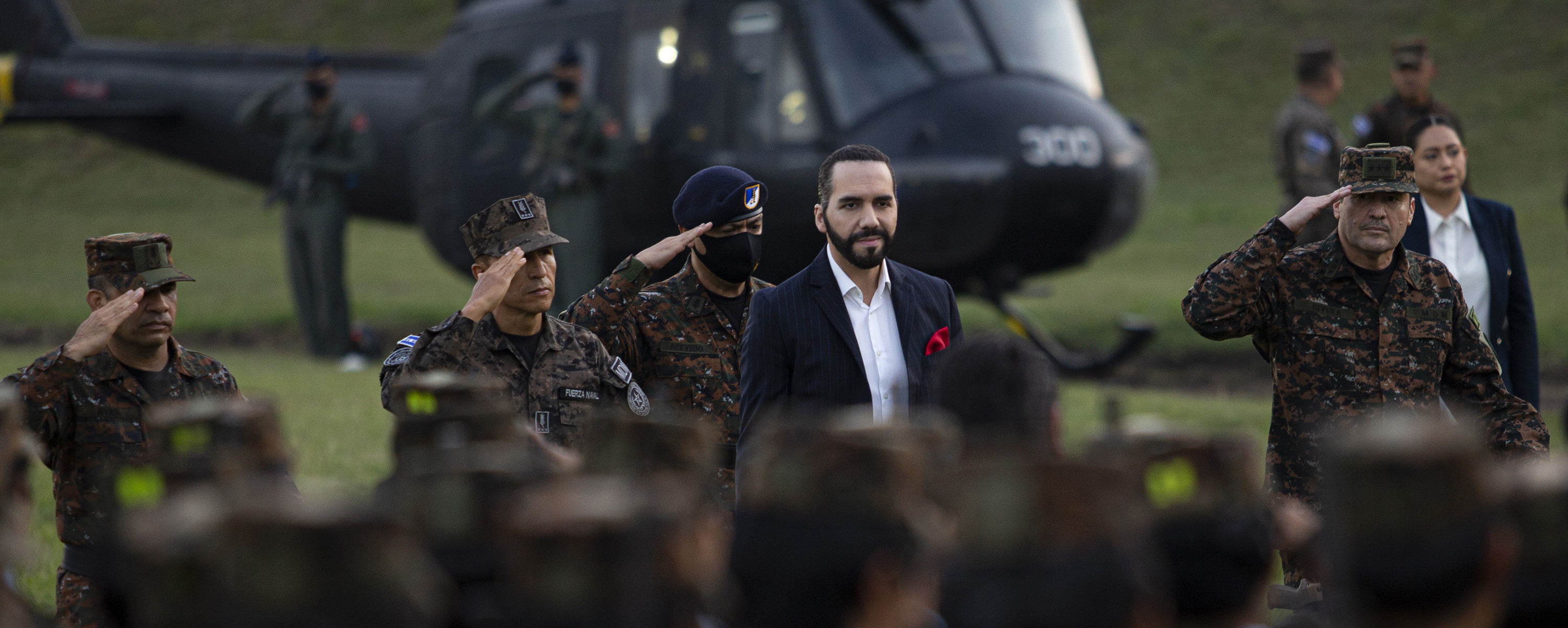The video of thousands of nearly naked gang members subdued and transferred to the new mega-prison was finished by the government’s propaganda team just in time to make the rounds in the media across the continent, selling the idea that Bukele is El Salvador’s strongman. He is doing away with criminals, the narrative goes, and that he will stop at no laws, constitutions, or human rights along the way. The images’ controversy achieved the main objective: smoke and mirrors — and it’s not the first time that we see them.
The footage of gang members sitting in a huge prison courtyard (allegedly “the largest prison in the world”) was a timely distraction from the Eastern District of New York. A judge had just unsealed a federal indictment of a dozen MS-13 leaders in which prosecutors alleged that the Bukele administration negotiated economic benefits, reduction of sentences, and changes to the law and jurisprudence in favor of the gang, all while sidestepping U.S. extradition requests.
In exchange, the prosecutors wrote, MS-13 reduced the murder rate and supported Bukele’s party, Nuevas Ideas, in the legislative and municipal elections. In summary: Bukele’s government partnered with, protected, and favored criminal groups.
Nobody in the administration has said a word about the U.S. government’s accusations — not the president, the director of prisons, the ministers of security or foreign relations, nor the ruling party legislators who, prosecutors allege, were elected in February 2021 with the help of the pact. The indictment not only backs up what El Faro and other news organizations have documented, but also seriously compromises a president who has denied them.
Bukele boasts of controlling each and every decision of his government and thus was unquestionably aware of his officials’ pact with gang leaders from the beginning. In the negotiations, he, too, had a codename: Batman. When the first evidence of that pact was published, Bukele had the opportunity to publicly decouple himself from the involved officials, in particular Osiris Luna, the director of prisons, and Carlos Marroquín, the director of Social Fabric. Not only did he not do that, but he protected them. Thus, none are more responsible than he for the pact.
Nayib Bukele has lied to us. He has done so over and over again about a criminal pact that withstood at least three massacres. The last one, which definitively broke off the accords in March 2022, claimed the lives of 87 Salvadorans. It’s the one that ushered in the state of exception. But there were two prior.
In November 2021, the gangs killed 45 people in three days. We now know that his officials met with the gang leaders to quell the crisis and prolong the pact. All the while, the security minister publicly insinuated that the political opposition and “de facto powers” were responsible, but he and the president knew full well that those responsible were their political partners in the secret negotiations. A pact was alive and in place, but a lie was simpler than explaining to Salvadorans that he had accorded political benefits for him and for his party over citizens’ blood. The government had granted economic and judicial benefits to criminal groups who had just killed four-dozen people.
Police officers wrote the details of the secret overtures to stem that crisis in reports to their superiors. Like the trove of other official documents that we have published, these confirm this government’s complicity with gangs.
But there was one prior known massacre under this administration. At the end of April 2020, amid the Covid-19 lockdown, gangs killed 76 people in four days. The president ordered the Army to use lethal force against any gang member and his propaganda team produced the first box office hit of imprisoned gangsters: thousands of bare-chested, tattooed men with buzz cuts were —then, as last week— crunched into rows in a prison courtyard, sitting and handcuffed, forming human chains. Those pictures, too, traveled around the world.
Bukele told the public at the time that they had located any gang member on the street and that those arrested would be sent to mixed prisons, not —as had been policy— separated by gang allegiance. He tweeted that the human rights organizations’ agenda was to defend “those who rape, kidnap, kill, and dismember,” while he was the one negotiating with them.
Those pictures were the first great propaganda exercise to portray the president as having an iron fist to combat crime. But he needed his pact more than ever, with less than a year remaining at the time until the legislative and municipal elections. Bukele pressed on with the lies and with his political alliance with the gangs after that massacre, and the next one.
The third one triggered the talks’ collapse eleven months ago, more than 200 bodies later.

